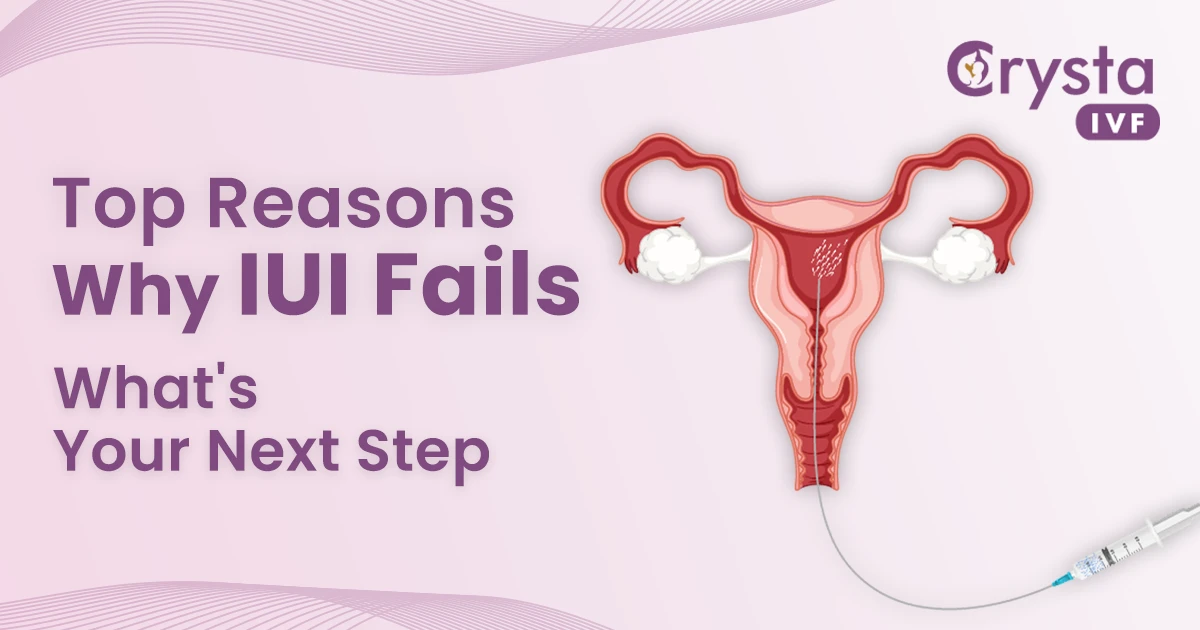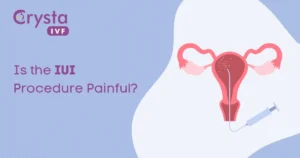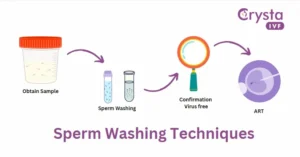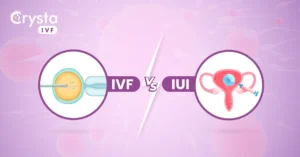IUI is a hope for many couples struggling with infertility. But what if IUI fails? Even IUI does not guarantee successful results. If you have experienced an IUI cycle that didn’t result in pregnancy, you are not alone. You need to understand the reason behind IUI failure.
IUI is a fertility treatment in which the sperm is directly placed into the uterus during ovulation. During the process, the sperm fuses the egg directly, and the chances of fertilization increase.
But the question is, why IUI fails? To understand the complexities of IUI and why it fails, read the complete blog.
Learning the “Why Not” before the “Why”
Even though IUI does not guarantee complete success for pregnancy, boasting a rate of confirmed pregnancy ranging from 10 to 20%, it is still a beacon of hope for many couples struggling to conceive. Add on the point of affordability, “why not” should a couple choose IUI as their alternative method for conception? It is crucial to remember that each cycle is a chance, and understanding the factors influencing success can maximize those chances.
Read More – What is the success rate of IUI?
Reasons for IUI Failure: Factors affecting the chances of conception through IUI
If you chose IUI as an alternative method for conceiving and it failed, do not conclude any judgment as a definite reason for it. The human reproduction system is complicated as it is; therefore, learning the reason why IUI fails is second to none. Below are the causes of IUI failure:
- Age: Unfortunately, the age factor plays a major role in pregnancy success. As women age, their fertility drops down. The egg quality and quantity decline with age, decreasing the chances of successful IUI, especially after 35. If you, as a woman, are also struggling with a similar problem, you must visit Crysta IVF; our doctors will help you ease down and make you comfortable enough so you can communicate freely about your age-related factors. It will help our doctors to create the best fertility treatment for you.
- Ovulation Issue: Precision is the key here. For IUI to work perfectly, your ovulation timing should be right on the clock. Irregular or lack of ovulation throws a curveball to the process of fertilization through IUI. Fertility medication or ovulation trackers help to highlight the fertile window and improve the chances of IUI success.
- Reproductive Health Conditions: Health issues like endometriosis, PCOS, or fibroids can make conception challenging. Addressing these conditions before starting with IUI treatment is crucial, and Crysta IVF can help you with it. Our doctors value your money, time, and the courage it took for you to choose IUI. We can help carve out the perfect treatment plan for treating these conditions before proceeding with IUI.
- Sperm Quality: Male infertility plays a significant role in IUI outcomes. Low sperm count, poor motility, or abnormal morphology can affect fertilization. Proper sperm analysis and sperm preparation techniques can improve sperm quality and improve chances of success.
- Previous Failed Attempts: Let’s say you chose IUI as your alternative method for conception but are securing repeated failed pregnancies. But do not worry or lose hope. Even though each IUI cycle is like a fresh opportunity, these failed attempts will help the doctors to analyze and identify the potential causes and adjust the treatment plan to optimize your chances for future IUI treatments.
Also Read – Precautions After IUI? Recovery Tips for Best Outcomes
Symptoms of Failed IUI
There are several signs that an IUI is unsuccessful, including:
- Menstruation: If the menstruation cycle continues, even after IUI, this means the procedure was unsuccessful.
- Negative Pregnancy Test: A negative result in pregnancy means unsuccessful IUI.
- Absence of Pregnancy Symptoms: Early pregnancy shows symptoms like nausea, breast tenderness, fatigue, and increased sense of smell. If these symptoms are missing, this means the IUI procedure fails.
- Basal Body Temperature (BBT) Remains the Same: If you’ve been tracking your BBT, a steady or declining temperature instead of a rise, this means IUI fails.
Also Read: Keys to a Successful IUI: Tips to Boost Your Fertility
What are the factors determining higher chances of IUI success?
IUI is a successful path to pregnancy, but certain factors may influence its effectiveness. Let’s explore the key factors to maximize your chances of successful IUI.
Insemination Timing:
- Knowing the timing of ovulation is crucial. The experts will monitor the right timing via ultrasound and hormonal tests to ensure the egg is at the peak of its receptivity.
- Healthy sperm can live for about 12-24 hours inside the female body, and a released egg can survive for 24-48 hours.
Sperm Preparation Technique:
- The sperm preparation technique helps to improve sperm quality by separating motile sperm from immotile sperm and other seminal fluid components.
- The density gradient centrifugation technique spins the semen sample and separates motile sperm from other components based on their weight. This increases the number of healthy sperm and improves the chances of successful fertilization.
Ovarian Stimulation:
- With increasing age, the ovarian reserve starts decreasing in women. The dip in the quality and quantity of eggs doesn’t need to happen over age. Sometimes, it can happen for other reasons, such as lifestyle and environment.
- Ovarian stimulation medications like clomiphene citrate (Clomid) or FHS injections encourage the ovaries to develop multiple mature eggs. Thus increases the chances of fertilization.
Quality of Sperm Wash:
- Just because your tank is full does not mean it is fertile. We’ll be open with you: old sperms carry a lot of debris and seminal fluid components that could hinder fertilization. Thus, proper sperm-washing techniques ensure that none of these hamper fertilization or cause an inflammatory response in the uterus.
Clinic Expertise and Protocols:
- Crysta IVF is the leading fertility center where experienced professionals are available to help you. We follow the right protocol for IUI so you can experience parenthood without any hindrance. Our doctors and embryologists are experts in sperm handling, insemination techniques, and monitoring procedures, which can significantly increase your chances of conceiving.
Other Silent Reasons for IUI Failures:
- Unknown Infertility – In some cases, even after all efforts, careful analysis, and without any apparent reason, IUI treatment fails. This can result in extreme frustration and disheartening couples. But it is important to remember that medical science is regularly evolving, with new diagnostic tools emerging. The smart thing to do is stay informed and open to exploring alternative options.
- Undiagnosed Conditions – Sometimes, there are certain medical conditions underlying within, like pelvic adhesions and uterine fibroids that have gone undetected. These conditions can hamper fertilization, rendering IUI unsuccessful. Therefore, seeking medical evaluation and exploring advanced diagnostic tests is crucial.
What To Do Next After IUI Failure?
It’s a human thing when couples put their hopes on IUI and other fertility treatments. But sometimes, the results are not promising and often lead to failure.
- Revise the treatment plan: It’s important to remember that the first thing you must do if your IUI treatment fails is to revisit your doctor and run through your treatment plans. The doctor will analyze your previous pregnancy cycles, identify potential setbacks, and suggest adjustments like changing the medication or doses. The doctor may also choose a different sperm preparation technique or modify the timing of insemination.
- Consider Other Options: Although IUI treatment has numerous advantages, it is not the only treatment available in your arsenal. Depending on the identified cause of failure, your doctor may suggest other fertility treatments like IVF. It has a higher success rate for couples with severe male infertility or age-related concerns.
- Emotional and Psychological Support: At Crysta IVF, we know your hopes will always be high when experiencing parenthood. But battling IUI failure can take its toll on your psychological and mental conditions. It can lead to sadness, anger, irritation, and isolation. It’s precisely this time when couples should seek support groups and therapy to deal with the situation properly. You may find other couples who have had a similar experience and could provide you with some valuable insights to deal with the problem and not lose hope.
Crysta IVF, the best fertility Centre in Delhi, empowers couples to make informed decisions. Our doctors, with more than ten years of experience in the industry, help couples gain all the information they need to make regarding their parenthood. While the journey may be challenging, remember there is always a way. Each IUI cycle is another opportunity for parenthood. As Nelson Mandela once said, “The greatest glory in living lies not in never falling, but in rising every time we fall.” To book a consultation with the right guidance, visit us at https://crystaivf.com/ or call 8938935353.




